Unruly Souls: The Digital Activism of Muslim and Christian Feminists
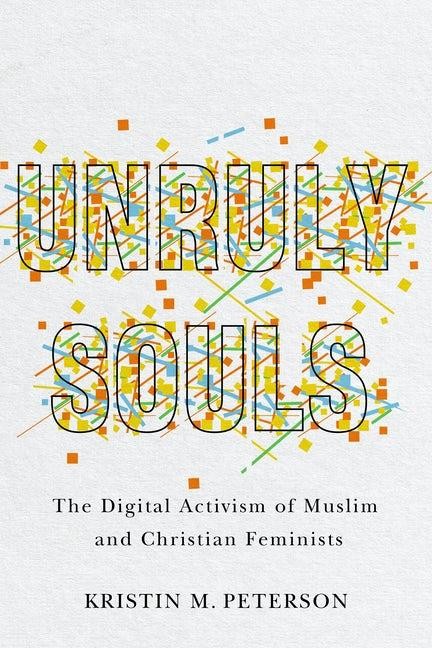
Kristin M. Peterson
Boston College
Date: Monday, October 3, 2022
Time: 12 - 1:15pm
Location: Boisi Center, 24 Quincy Road, Conference Room 101
RSVP: Click this link to sign up for luncheon colloquium. RSVP required for head count to order food.
Abstract
This presentation explores the intersectional feminist activism emerging in digital spaces among young people raised within Islam and Evangelical Christianity. In an effort to address gender-based violence, institutional racism, and homophobia in religious institutions, young religious misfits employ the creative tactics of digital media in their work to seek justice and to display their fundamental equality in the eyes of God. This presentation will analyze various digital projects from hip-hop music videos and Instagram accounts to Twitter hashtags and podcasts in an effort to explore how the hybrid, flexible, playful, and sensory nature of digital media facilitates intersectional feminist activism within and beyond religious communities. Drawing on work from queer theory, decolonial theory, and Black feminist theory, this study examines how those who have been marginalized are able to effectively deploy their disregarded status along with digital media tactics to cultivate empathetic communities for those recovering from religious trauma.
Speaker Bio
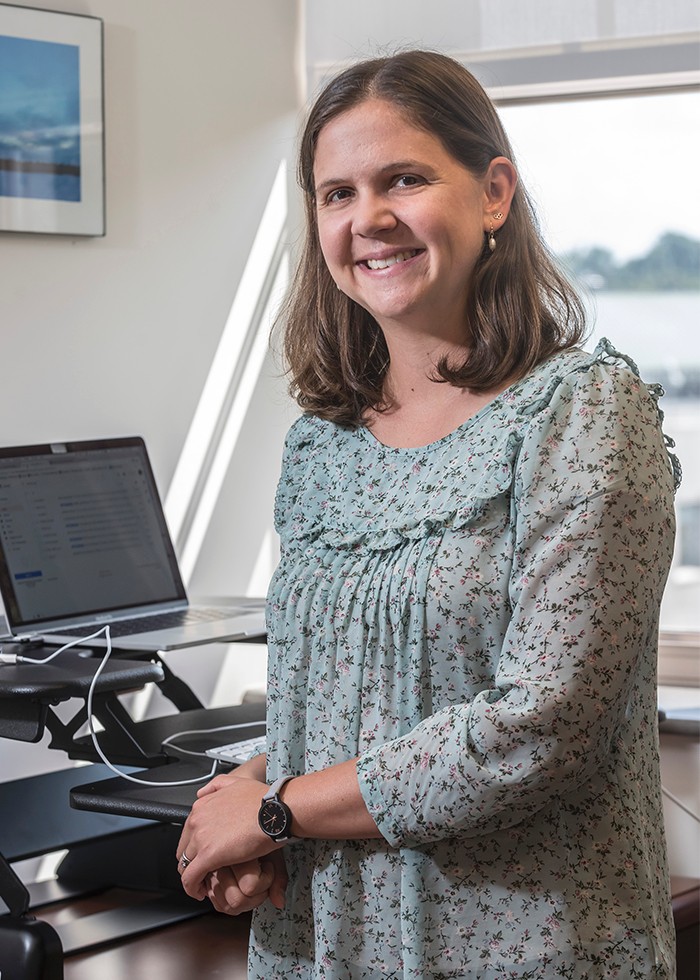
Kristin M. Peterson is an assistant professor in the department of communication at Boston College, teaching courses related to the intersections of media and religion. She earned her Ph.D. in media studies from the University of Colorado Boulder, where she was also a research fellow for the Center for Media, Religion and Culture. Her research focuses on religious expression in digital media, specifically examining how young people engage with online media sites, images, videos and creative projects as spaces to develop meaning and for feminist activism. She is the author of Unruly Souls: The Digital Activism of Muslim and Christian Feminists (Rutgers University Press, 2022), as well as articles and book chapters on Muslim Instagram influencers, the #ChurchToo and #MosqueMeToo movements, podcasts as spaces to discuss grief, the digital mourning after the murder of three Muslim college students in Chapel Hill, North Carolina, hijab tutorial videos on YouTube, and the Ms. Marvel comic series.
Read More
Peterson, Kristin M. “Aesthetic Styles and the Occupation of Space in the ‘Places You’ll Pray’ Photo Series.” Journal of Media, Religion, and Digital Culture 10, no. 1 (August 2021): 115-134.
__________. “Hybrid Styles, Interstitial Spaces, and the Digital Advocacy of the Salafi Feminist.” Critical Studies in Media Communication 37, no. 3 (July 2020): 254-266.
__________. “Islamic Fashion Images on Instagram and the Visuality of Muslim Women,” in Race and Gender in Electronic Media: Content, Context, Culture. Edited by Rebecca Ann Lind. New York: Routledge, 2017.
__________. “MuslimGirlWoke: A Muslim Lifestyle Website Challenges Intersectional Oppression,” in Cyber Muslims: Mapping Islamic Digital Media in the Internet Age. Edited by Robert Rozehnal. New York: Bloomsbury, 2022.
__________. “The Unruly, Loud and Intersectional Muslim Woman: Interrupting the Aesthetics Styles of Islamic Fashion Images on Instagram.” International Journal of Communication 14 (2020): 1194-1213.
Additional Resources:
Amijee, Fatema. “How to Be a Feminist Muslim.” Journal of the American Philosophical Association 8, no. 3 (Fall 2022): 1-21.
Carland, Susan. “Islam and feminism are not mutually exclusive, and faith can be an important liberator.” The Conversation. May 10, 2017. https://theconversation.com/islam-and-feminism-are-not-mutually-exclusive-and-faith-can-be-an-important-liberator-77086
King, Ursula. “Christianity and Feminism: Do they need each others?” International Journal for the Study of the Christian Church 4, no. 3 (2004): 194-206.
Messina-Dysert, Gina, Jennifer Zobair, and Amy Levin, eds. Faithfully Feminist: Jewish, Christian, & Muslim Feminists on Why We Stay. Ashland, OR: White Cloud Press, 2015.
Ochoa, Christina. “‘Daughters of Sarah’: Paving the Way for Christian Feminist Theology.” atla. March 24, 2021. https://www.atla.com/blog/daughters-of-sarah/.
Pandit, Idrisa. "Faith, Feminism, and the Other: Rethinking Christian and Muslim Women’s Engagement." Consensus. 39, no. 1 (2018). https://scholars.wlu.ca/cgi/viewcontent.cgi?article=2366&context=consensus.
In the News
In this article from the Religion News Service, Kathryn Post details the Pink Robe Chronicles, Liberated Together, and QUNI, three online groups that variously minister to women, women of color, disabled people, queer people, and people of color. These online platforms foreground theologies that are underutilized in mainstream religion, such as womanism, African ritual practice, and theology that, as Post refers to it, “isn’t made for Sunday morning walk-ins.” And they work to find safe spaces–or as one of the groups’ leaders calls them, “digital hush harbors”–for marginalized groups to gather and reflect on their faith.
On October 3rd, the Boisi Center hosted its first guest of the school year. Kristin Peterson, an assistant professor in Boston College’s communication department, spoke to an audience of students, staff, and fellow professors about the intersectionality of women in Christian and Muslim Feminist movements across the digital world.
The presentation and later discussion focused on the research from Peterson’s new book, Unruly Souls: The Digital Activism of Muslim and Christian Feminists. Peterson began the afternoon by explaining some images representing the purity and modesty cultures in Islam and Christianity to immediately showcase the intersection of the digitalized feminist movements. Peterson calls these voices for reform “unruly souls,” people who are not as accepting of the (in their view) toxic institutional and inherently patriarchal modesty and purity cultures. Peterson found that these activists were frustrated with their lack of agency–their concern was not necessarily the desire to reverse these practices or the values they represent, but to ensure that these practices were a matter of choice for the adherents. Therefore, Peterson understands their leaning into these digital spaces (i.e., YouTube, Instagram, etc.) as a way of advocating for agency within the ethical frameworks of their various religious communities. Peterson approached the presentation by illustrating each chapter's value of focus (e.g., purity) with an example of digital activism. For example, the audience heard about textual endorsements of purity culture such as the book, I Kissed Dating Goodbye, alongside the digital responses through rearticulated Twitter phrases like “I Kissed Straighting Goodbye'' by Matthaus Roberts. Peterson also discussed the Hijab alongside influencers that speak for chosen modesty. These latter influencers challenged what they considered unrealistic images of women in modern, modest, and pastel Muslim dress, claiming that those movements were nothing more than shallow appearance. Peterson also showcased some podcasts, such as Exvangelical, Queerology, and Truth Table. She reflected on the way these conversations use the same theological discipline to rethink the theologies used to suppress their agency.
As the presentation shifted to a conversation, questions were raised about the industry of purity advocacy. It was noted that Christianity has effectively utilized the market to propagate a commercial purity line that permeates society–something that, at least in the United States, is missing from the Islamic counterpart. This led the group further into discussion about the connections between movements, institutions, and the association of the movements and their beliefs in sexual ethics and celibacy, that is sometimes forgotten by the secular followers and hidden in the excitement of social activism. It was clarified that many of these digital spokespeople still hold values of Muslim and Christian sexual ethics and pre-marital celibacy, but are fighting for their choice and agency within those values.
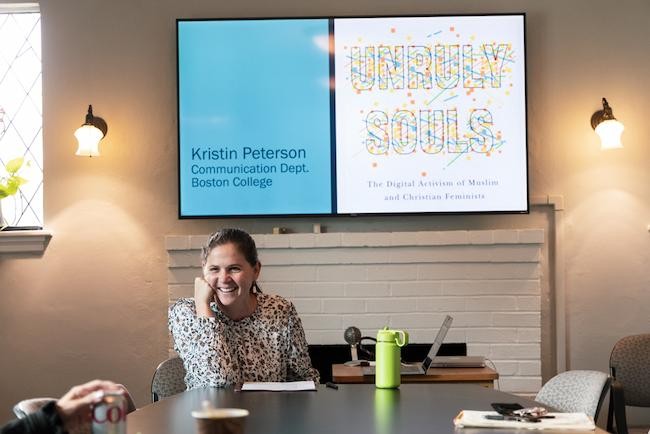
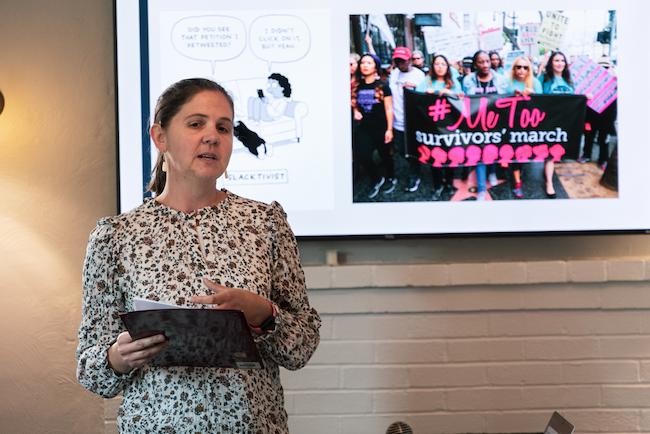
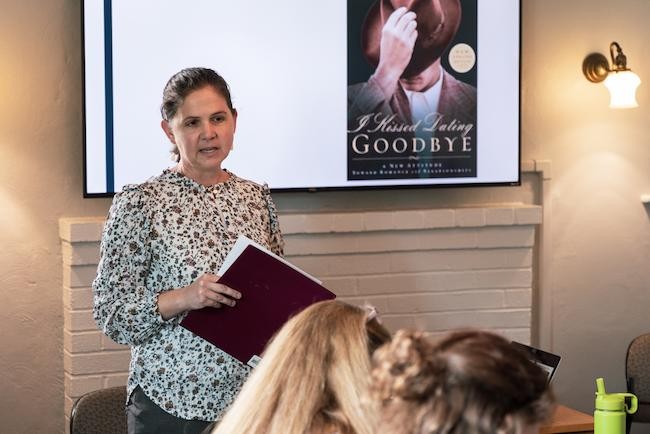
Photo Credits: Christopher Soldt, MTS

